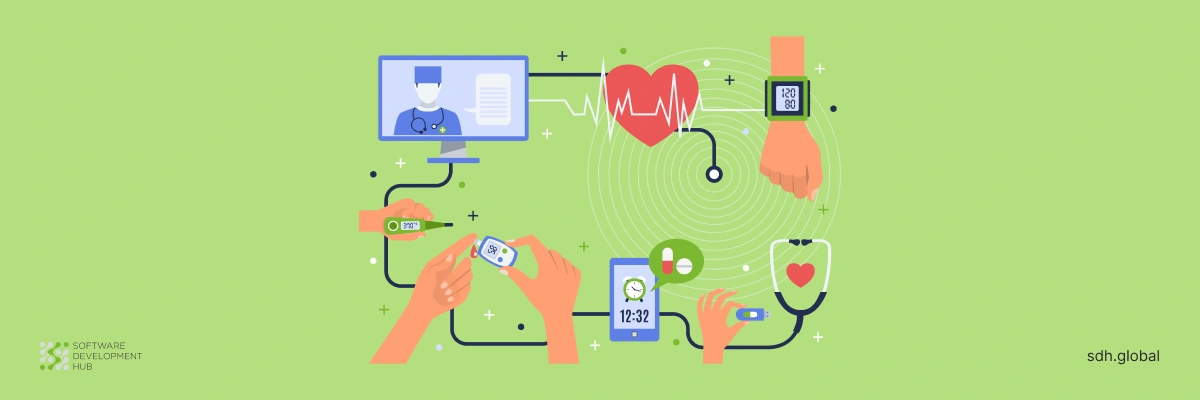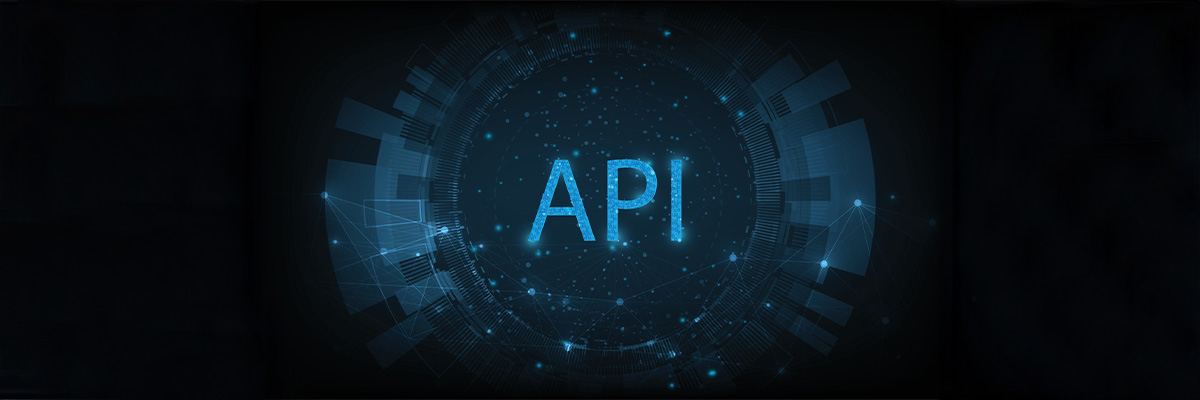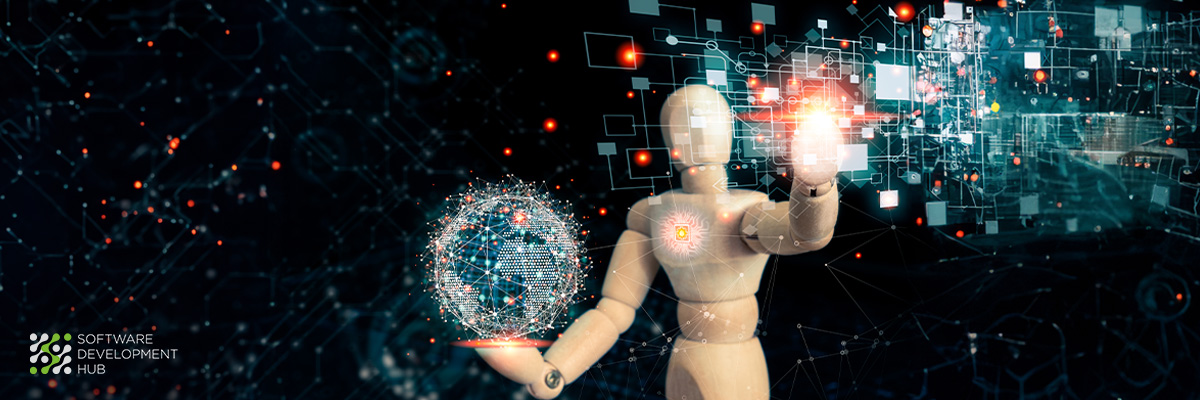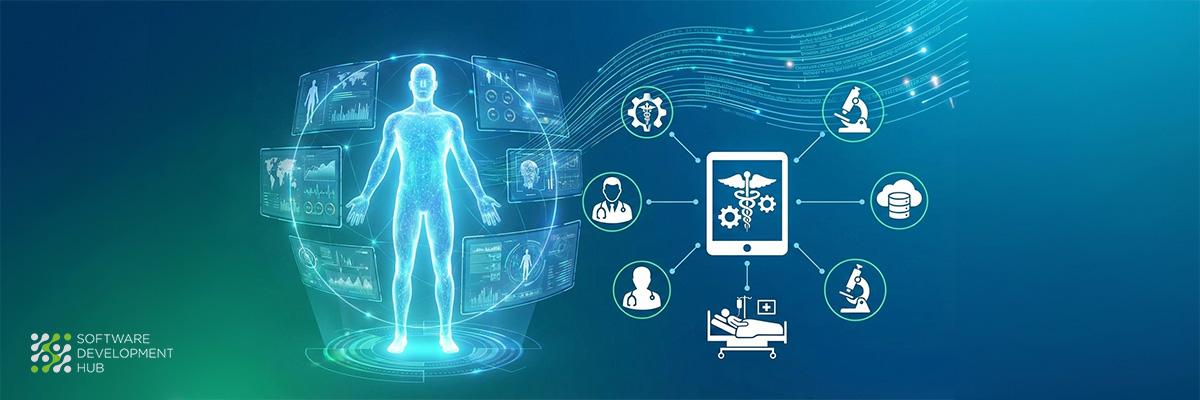Impact of IoT in Healthcare: Comprehensive Analysis
The Internet of Things has become firmly integrated into the healthcare industry, transforming the way staff work. The obvious advantages of the Internet of Things, once connected to the system, are inextricably linked with problems. We will tell you more about the obstacles to the integration of the Internet of Things and its advantages below.
The Healthcare IoT market worldwide is projected to reach a revenue of US$93.82bn by 2023. It is expected to show an annual growth rate (CAGR 2023-2028) of 12.32%, leading to a market volume of US$167.70bn by 2028.

In terms of global comparison, in the United States is expected to generate the highest revenue with US$8,283.00m in 2023.
In the United States, the healthcare IoT market is rapidly growing, with an increasing number of hospitals adopting smart medical devices and remote patient monitoring systems.
How Is IoT in Healthcare Changing Medicine?
The integration of the Internet of Things (IoT) into the healthcare industry has ushered in a new era of possibilities, transforming the way medicine is practiced and healthcare services are delivered. IoT in healthcare refers to the interconnection of medical devices, sensors, and software applications through the internet, creating a network that facilitates real-time data exchange. This connectivity has far-reaching implications for the entire healthcare ecosystem.
One of the most significant changes brought about by IoT in healthcare is the enhancement of patient care through remote monitoring. With wearable devices and sensors, patients can now be monitored in real time, providing healthcare professionals with continuous data on vital signs, medication adherence, and overall health status. This not only improves the quality of care but also enables early detection of potential health issues, leading to timely interventions.
Moreover, IoT has streamlined healthcare operations by optimizing resource utilization. From managing inventory to tracking the location of medical equipment, IoT solutions contribute to efficient hospital management. This results in cost savings and improved workflow, allowing healthcare providers to allocate more time and resources to patient care.
Benefits of IoT in Healthcare
Remote Patient Monitoring
Remote patient monitoring is a key benefit of IoT in healthcare. Wearable devices and sensors enable continuous monitoring of patients, allowing healthcare providers to gather real-time data on vital signs and other health parameters. This proactive approach enhances patient care by facilitating early intervention and personalized treatment plans.
Explore our case: Telehealth system for remote patient diagnostics
Improved Patient Engagement
IoT promotes patient engagement through interactive technologies. Patients can actively participate in their healthcare by accessing their health data, receiving timely alerts, and even communicating with healthcare providers remotely. This level of engagement fosters a sense of responsibility for one's health, leading to better adherence to treatment plans and healthier lifestyles.
Enhanced Operational Efficiency
In healthcare institutions, the implementation of IoT leads to improved operational efficiency. From inventory management to equipment maintenance, IoT solutions automate various processes, reducing the burden on healthcare staff. This not only saves time but also lowers operational costs, allowing healthcare providers to allocate resources more effectively.
Data-Driven Decision-Making
The massive amount of data generated by IoT devices in healthcare can be leveraged for data-driven decision-making. Advanced analytics and machine learning algorithms can extract valuable insights from this data, aiding healthcare professionals in making informed decisions. This data-driven approach not only improves patient outcomes but also contributes to medical research and innovation.
Read also: How AI in Healthcare Is Transforming Industry
Challenges of IoT in Healthcare
Data Security and Privacy Concerns
The interconnected nature of IoT devices in healthcare raises significant concerns about data security and patient privacy. The transmission and storage of sensitive health data make these systems susceptible to cyber threats. Addressing these challenges requires robust security measures, including encryption, authentication protocols, and regular security audits.
Interoperability Issues
The lack of standardization and interoperability among various IoT devices and platforms poses a challenge in creating a seamless healthcare ecosystem. Healthcare providers often use a variety of devices from different manufacturers, and ensuring compatibility and data exchange between these devices is crucial for effective IoT implementation.
Regulatory Compliance
The healthcare industry is subject to strict regulatory requirements to ensure patient safety and data integrity. Integrating IoT devices into this regulated environment necessitates compliance with standards and regulations. Achieving and maintaining regulatory compliance can be complex, requiring continuous monitoring and adaptation to evolving legal frameworks.
Limited Resources and Budget Constraints
While IoT in healthcare offers numerous benefits, the implementation of these technologies requires significant financial investment. Many healthcare institutions, especially smaller ones, may face budget constraints and a lack of resources for the adoption of IoT solutions. Overcoming these challenges involves strategic planning and prioritization of essential IoT applications.
Read also: 3D Medical Metaverse: How will Metaverse Drastically Transform Healthcare Industry?
Examples
Smart Wearables for Chronic Disease Management
IoT-enabled smart wearables, such as glucose monitors for diabetes or continuous cardiac monitoring devices, empower individuals to manage chronic conditions effectively. These devices provide real-time data to both patients and healthcare providers, allowing for timely interventions and personalized treatment plans.
Hospital Asset Tracking
IoT is revolutionizing hospital management through asset tracking solutions. By deploying sensors on medical equipment, hospitals can monitor the location and usage of assets in real time. This not only prevents loss or theft but also ensures that equipment is available when needed, optimizing resource utilization.
Telehealth and Remote Health Monitoring Consultations
The integration of IoT facilitates telehealth and remote consultations, especially relevant in times of global health crises. Connected devices enable healthcare professionals to monitor patients remotely, conduct virtual consultations, and deliver healthcare services beyond the confines of traditional healthcare settings.
The integration of IoT in healthcare is leading to transformational changes, offering numerous benefits to both patients and healthcare providers. While issues such as data security and interoperability must be addressed, the potential for improved patient care, operational efficiency, and data-driven decision making makes IoT a critical component of the future of healthcare. The Software Development Hub company will take on the task of implementing the Internet of Things into your company's system. Strategic planning, investment, and collaboration among stakeholders as a result of integration will unlock the potential of the Internet of Things and transform the healthcare landscape.
Categories
Share
Need a project estimate?
Drop us a line, and we provide you with a qualified consultation.








